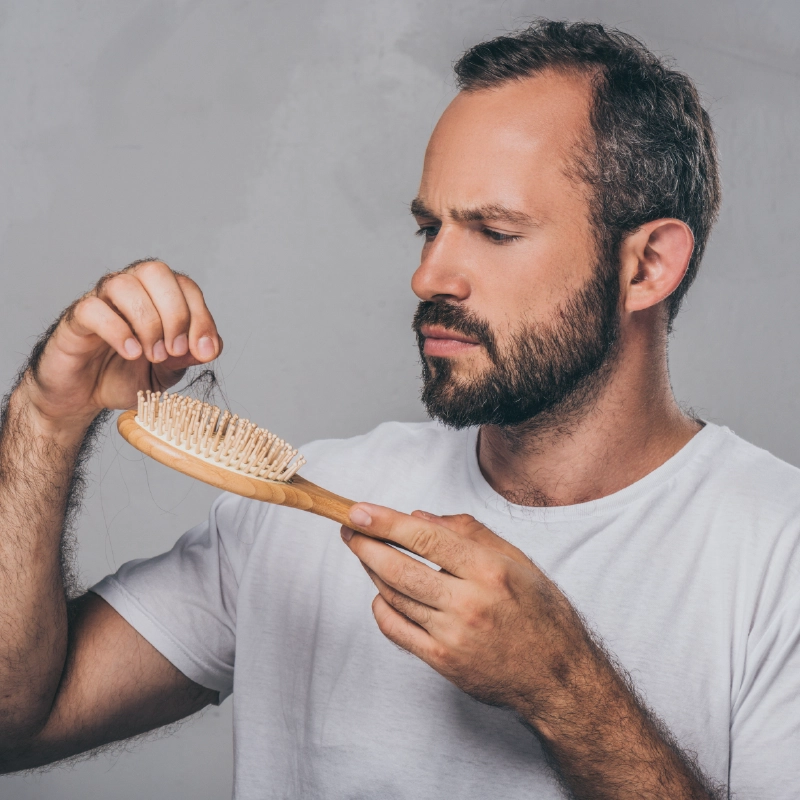
Hair loss, also known as alopecia, is a common condition that affects both men and women of all ages. It can be caused by a variety of factors, including genetics, hormonal changes, medications, stress, and nutritional deficiencies. While hair loss can be distressing, there are many treatments available to help slow or even reverse the process. You can consult a certified dermatologist and discuss hair fall treatment in Bangalore. In this article, we will explore the various types of hair loss, their causes, and the available treatment options to help you understand and manage this common condition.
Types of Hair Loss
There are several types of hair loss, each with its own set of causes and characteristics. Here are some of the most common types:
Androgenetic alopecia: Also known as male or female pattern baldness, this type of hair loss is caused by a genetic predisposition and hormonal factors. It typically starts with a receding hairline or thinning at the crown of the head and progresses over time.
Telogen effluvium: This is a temporary type of hair loss that is triggered by physical or emotional stressors such as surgery, illness, pregnancy, or extreme weight loss. Hair typically falls out in large clumps several months after the triggering event.
Alopecia areata: This is an autoimmune disorder in which the body's immune system attacks hair follicles, causing hair to fall out in small, round patches on the scalp, face, or other parts of the body.
Understanding the type of hair loss you are experiencing is an important first step in finding the right treatment.
Common Causes of Hair Loss
Genetics: Androgenetic alopecia, also known as male or female pattern baldness, is a hereditary condition that affects millions of people worldwide. It is caused by a combination of genetic and hormonal factors and typically results in hair thinning and balding in a predictable pattern.
Hormonal changes: Women, in particular, may experience hair loss during pregnancy, menopause, or other times when hormone levels fluctuate. Hormonal imbalances, such as those associated with thyroid disease or polycystic ovary syndrome (PCOS), can also lead to hair loss.
Medications: Certain medications, such as chemotherapy drugs and some antidepressants, can cause hair loss as a side effect.
Stress: Stress can cause hair loss, especially in people who are already genetically predisposed to it. Telogen effluvium is a type of hair loss that is caused by stress and can result in thinning hair all over the scalp.
Nutritional deficiencies: Nutritional deficiencies, such as iron or vitamin D deficiencies, can lead to hair loss.
Hairstyles: Wearing hairstyles that pull the hair too tight, such as tight braids or ponytails, can cause a type of hair loss called traction alopecia.
Treatment for Hair Loss
The treatment options for hair loss depend on the underlying cause of the condition. Here are some of the most common treatments for hair loss:
Medications: For genetic hair loss, medications such as finasteride and minoxidil can be effective at slowing or even reversing the process. Finasteride works by blocking the conversion of testosterone into dihydrotestosterone (DHT), a hormone that can contribute to hair loss. Minoxidil works by increasing blood flow to the hair follicles, which can promote hair growth.
Hair transplant surgery: Hair transplant surgery involves removing small plugs of skin containing hair follicles from areas of the scalp where hair is still growing and transplanting them to areas where hair is thinning or balding. This procedure is usually performed under local anesthesia and can be a permanent solution for hair loss.
Scalp reduction surgery: In scalp reduction surgery, the balding area of the scalp is removed and the remaining scalp is pulled together to cover the area. This procedure can be used in combination with hair transplant surgery for a more natural-looking result.
Hormone replacement therapy: For hormonal hair loss, addressing the underlying hormonal imbalance may help slow or stop hair loss. Hormone replacement therapy, which involves supplementing the body with hormones that are deficient, can be effective for some people.
Lifestyle changes: In cases where hair loss is caused by stress or nutritional deficiencies, lifestyle changes can be effective in treating the condition. Eating a healthy diet, getting enough sleep, and managing stress through relaxation techniques such as meditation or yoga can all help promote healthy hair growth.
Wearing wigs or hairpieces: For some people, wearing a wig or hairpiece can be a temporary or permanent solution for hair loss.
While hair loss can be a distressing condition, there are many treatment options available to help slow or even reverse the process. Whether caused by genetics, hormonal changes, medications, stress, or nutritional deficiencies, there are steps you can take to promote healthy hair growth and reduce the impact of hair loss on your life. If you are experiencing hair loss, consult with a dermatologist or hair specialist doctor in Bangalore at Sakra World Hospital to determine the underlying cause and develop a treatment plan that is right for you.
